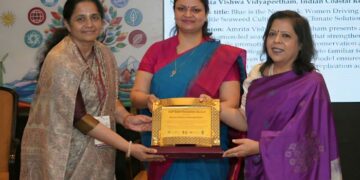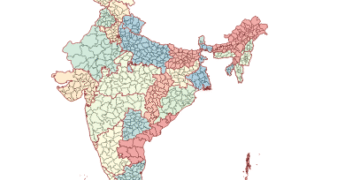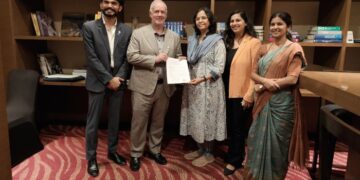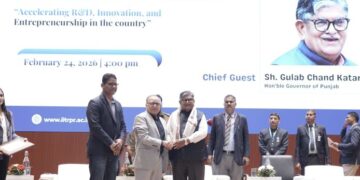In accordance with the NEP 2020, University Grants Commission (UGC)—the higher education regulating agency in India, has formulated a new student-centric revised “Curriculum and Credit Framework for Undergraduate Programmes (CCFUP)” incorporating a flexible choice-based credit system (CBCS), multidisciplinary approach, and multiple entry and exit options for Undergraduate Programs. This will facilitate students to pursue their career path by choosing the subject/field of their interest.
In a letter dated December 12, 2022 addressed to heads of universities, the Commission has said the new framework has been conceived and prepared on the recommendation of the NEP 2020 to instill innovation and flexibility in higher education.
For this an exert committee comprising Prof R P Tiwari, VC central University of Punjab, Prof HCS Rathore, former VC, Cerntral University of Central Bihar, Prof A C Pandey, director Inter-University Accelerator Centre, Dr Shalini Bharat, Director TISS, P Duraisamy, former VC Madras University, Prof Kavita Sharma, DSE, Delhi University, Dr Renu Batra, former Finance officer Jamia Milia Islamia, Prof K Ramchandran, senior Advisor NIEPA, N Gopu Kumar, joint secretary UGC and other supporting UGC officials, had submitted its work on December 7 to the Commission.
The Main features of the New Curriculum Framework include:
i. Flexibility to move from one discipline of study to another; ii. Opportunity for learners to choose the courses of their interest in all disciplines; iii. Facilitating multiple entry and exit options with UG certificate/ UG diploma/ or degree depending upon the number of credits secured; iv. Flexibility for learners to move from one institution to another to enable them to have multi and/or interdisciplinary learning; v. Flexibility to switch to alternative modes of learning (offline, ODL, and Online learning, and hybrid modes of learning)
Regulations for Academic Bank of Credit (ABC) and guidelines for Multiple Entry and Exit are already in place to facilitate the implementation of the proposed “Curriculum and Credit Framework for Undergraduate Programmes”.
The eligibility will remain unchanged and will be Senior Secondary School Leaving Certificate or Higher Secondary (12th Grade) Certificate obtained after successful completion of Grade 12 or equivalent stage of education corresponding to Level-4
Vocational Education and Training will form an integral part of the undergraduate programme to impart skills along with theory and practical. A minimum of 12 credits will be allotted to the ‘Minor’ stream relating to Vocational Education and Training and these can be related to the major or minor discipline or choice of the student. These courses will be useful to find a job for those students who exit before completing the programme.
Duration of the Programme
The duration of the UG programme is 4 years or 8 semesters. Students who desire to undergo a 3-year UG Programme will be allowed to exit after completion of the 3rd year. If a student wants to leave after the completion of the first or second year, the student will be given a UG Certificate or UG Diploma, respectively, provided they secure the prescribed number of credits . Students who exit with a UG certificate or UG diploma are permitted to re-enter within three years and complete the degree programme. ii. Students may be permitted to take a break from the study during the period of study but the total duration for completing the programme shall not exceed 7 years.
A semester comprises 90 working days and an academic year is divided into two semesters. A summer term is for eight weeks during summer vacation. Internship/apprenticeship/work-based vocational education and training can be carried out during the summer term, especially by students who wish to exit after two semesters or four semesters of study. Regular courses may also be offered during the summer on a fast-track mode to enable students to do additional courses or complete backlogs in coursework. The HEIs can decide on the courses to be offered in the summer term depending on the availability of faculty and the number of students.
Students should secure the prescribed number of credits (about 50% of total credits) through core courses in the major discipline. Minor discipline helps a student to gain a broader understanding beyond the major discipline. For example, if a student pursuing an Economics major obtains a minimum of 12 credits from a bunch of courses in Statistics, then the student will be awarded B.A. degree in Economics with a Minor in Statistics.
Students who opt to exit after completion of the first year and have secured 40 credits will be awarded a UG certificate if, in addition, they complete one vocational course of 4 credits during the summer vacation of the first year. These students are allowed to re-enter the degree programme within three years and complete the degree programme within the stipulated maximum period of seven years.
UG Diploma: Students who opt to exit after completion of the second year and have secured 80 credits will be awarded the UG diploma if, in addition, they complete one vocational course of 4 credits during the summer vacation of the second year. These 10 Curriculum and Credit Framework for Undergraduate Programmes students are allowed to re-enter within a period of three years and complete the degree programme within the maximum period of seven years.
3-year UG Degree: Students who wish to undergo a 3-year UG programme will be awarded UG Degree in the Major discipline after successful completion of three years, securing 120 credits and satisfying the minimum credit requirement.
4-year UG Degree (Honours): A four-year UG Honours degree in the major discipline will be awarded to those who complete a four-year degree programme with 160 credits and have satisfied the credit requirements.
4-year UG Degree (Honours with Research): Students who secure 75% marks and above in the first six semesters and wish to undertake research at the undergraduate level can choose a research stream in the fourth year. They should do a research project or dissertation under the guidance of a faculty member of the University/College. The research project/dissertation will be in the major discipline. The students who secure 160 credits, including 12 credits from a research project/dissertation, are awarded UG Degree (Honours with Research). I
nfrastructure Requirement: The Departments offering a 4-year UG Degree (Honours with Research) must have the required infrastructure such as the library, access to journals, computer lab and software, laboratory facilities to carry out experimental research work, and at least two permanent faculty members who are recognized as Ph.D. supervisors. The Departments already recognized for conducting the Ph.D. programme may conduct a 4-year UG Degree (Honours with Research) without obtaining any approval from the affiliating University.

Courses
A course can have a combination of lecture credits, tutorial credits, and practicum credits. Each of them will require a specific number of hours of teaching/guidance and laboratory/studio/workshop activities, field-based learning/projects, internships, and community engagement and service .
Lecture courses: Courses involving lectures relating to a field or discipline by an expert or qualified personnel in a field of learning, work/vocation, or professional practice.
Tutorial courses: Courses involving problem-solving and discussions relating to a field or discipline under the guidance of qualified personnel in a field of learning, work/vocation, or professional practice.
Practicum or Laboratory work: A course requiring students to participate in a project or practical or lab activity that applies previously learned/studied principles/theory related to the chosen field of learning, work/vocation, or professional practice under the supervision of an expert or qualified individual in the field of learning, work/vocation or professional practice
Seminar: A course requiring students to participate in structured discussion/conversation or debate focused on assigned tasks/readings, current or historical events, or shared experiences guided or led by an expert or qualified personnel in a field of learning, work/vocation, or professional practice.
Internship: A course requiring students to participate in a professional activity or work experience, or cooperative education activity with an entity external to the education institution, normally under the supervision of an expert of the given external entity. A key aspect of the internship is induction into actual work situations. Internships involve working with local industry, government or private organizations, business organizations, artists, crafts persons, and similar entities to provide opportunities for students to actively engage in on-site experiential learning.
Studio activities: Studio activities involve the engagement of students in creative or artistic activities. Every student is engaged in performing a creative activity to obtain a specific outcome. Studio-based activities involve visual- or aesthetic[1]focused experiential work.
Field practice/projects: Courses requiring students to participate in field-based learning/projects generally under the supervision of an expert of the given external entity.
Community engagement and service: Courses requiring students to participate in field-based learning/projects generally under the supervision of an expert of the given external entity. The curricular component of ‘community engagement and service’ will involve activities that would expose students to the socio-economic issues in society so that the theoretical learnings can be supplemented by actual life experiences to generate solutions to real-life problems.
Reactions:
“ We see the recent UGC announcement on credit and curriculum framework as a crucial building block to bring about the transformational changes needed to realize the NEP 2020 vision. Institutions now have a clear direction, along with the government support needed to solve pressing challenges, including developing ways to narrow skill gaps in the workforce, bringing multidisciplinary learning into the mainstream, personalizing learning systems and rethinking credentials for the knowledge economy.
With the government propelling the adoption of online learning, allowing 40% of credits in any category to be earned through platforms like Coursera, we’re excited about this momentum spreading across the country and supporting more universities & colleges to build India’s young and competitive workforce. Through the high-quality blended learning options, institutions will be able to arm their students with in-demand skills and help them identify new pathways into well-paying jobs,” said Raghav Gupta, Managing Director, India and APAC, Coursera.











